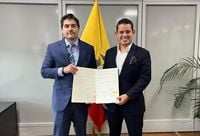Ecuador has taken a significant step in its trade relations with China by signing a bilateral protocol that allows for the export of Ecuadorian dairy products to the Asian giant. The agreement was formalized on April 30, 2025, marking the first anniversary of the Free Trade Agreement (TLC) between the two nations.
The Ministry of Production, Foreign Trade, Investments and Fisheries (Mpceip) announced on May 1, 2025, that the newly signed protocol outlines the necessary sanitary, inspection, and quarantine requirements for Ecuadorian dairy products entering China, which is one of the largest consumer markets in the world.
Dairy products encompass a variety of items derived from milk, including liquid milk, cheese, yogurt, butter, cream, condensed milk, and powdered milk. This agreement is a significant milestone for the Ecuadorian dairy industry, which has been seeking new markets due to low local consumption.
The successful signing of this protocol is the result of coordinated efforts among various governmental bodies, including the Ministry of Production, the Ministry of Agriculture and Livestock (MAG), Agrocalidad, the National Agency for Health Regulation, Control and Surveillance (ARCSA), and the private sector. Since October 2024, these entities have intensified their diplomatic and technical efforts with the Chinese government to facilitate this agreement.
A key moment in this process occurred in September 2024 when a delegation from the General Administration of Customs of China visited Ecuador. During this visit, they inspected six dairy farms and three processing plants to evaluate the national quality and safety systems for dairy products. This inspection was crucial in validating Ecuador's production and sanitary processes, which ultimately helped finalize the text of the protocol.
With the signing of this protocol, Ecuadorian dairy companies interested in exporting to China must now register with the General Administration of Customs of China to comply with the established guidelines. This registration is the first step in gaining formal access to the Chinese market, which boasts a consumer base of approximately 1.4 billion people with significant purchasing power.
Danilo Palacios, Ecuador's Minister of Agriculture, emphasized the importance of this agreement, stating, "We produce more milk than we consume, so opening new markets is essential. We have a multitude of dairy derivatives with great potential in a dynamic market like China." He further noted that the dairy industry generates over 500,000 direct and indirect jobs in Ecuador, highlighting its vital role in the economy.
Andrés Robalino, the Deputy Minister of Production and Industries, echoed this sentiment, stating that this opening will enhance Ecuador's presence in global trade. He remarked, "The entry of new Ecuadorian products into this market represents a strategic leap for the growth of the sector, strengthening Ecuador's position in global commerce."
Patricio Almeida, the Executive Director of Agrocalidad, described the signing of the protocol as a landmark achievement for the national agro-food sector, as it aligns with the rigorous international standards set by China. The successful implementation of sanitary certifications, quality standards, and good agricultural practices has been crucial in establishing these requirements.
The Ecuadorian government has been proactive in diversifying its markets. This agreement with China is part of a broader strategy to enhance the competitiveness of the national agro-food sector, which aims to stimulate rural economies and provide new opportunities for local producers.
In addition to the agreement with China, the Ecuadorian dairy sector has also secured permissions to export to other countries in the region, including El Salvador, Argentina, Peru, and Chile. For instance, Vita Alimentos has successfully entered the Peruvian market, with initial shipments totaling 118,800 liters and a commercial agreement for the production and export of 80,000 liters of milk monthly.
In 2024, Ecuador's dairy industry reported sales of $400.9 million, reflecting a 5.39% increase compared to the previous year. This growth underscores the potential of the dairy sector to thrive in international markets while addressing the challenges of local consumption.
Despite the positive outlook, the local consumption of dairy remains a concern. Ecuador's per capita milk consumption stands at 114 liters per year, significantly lower than the 180 liters recommended by the World Health Organization (WHO). This low consumption level has prompted the dairy industry to seek opportunities beyond its borders to ensure sustainability and growth.
The recent signing of the protocol with China has been received positively by various stakeholders in the Ecuadorian dairy industry, who view it as a vital step toward enhancing their global footprint. The hope is that this agreement will not only open new markets but also boost local production and consumption through increased awareness of the benefits of dairy products.
As Ecuadorian dairy products prepare to enter the Chinese market, the government and industry leaders are optimistic about the potential for growth and the positive impact it could have on the country's economy. This agreement represents a significant opportunity for Ecuador to showcase its quality dairy products on an international stage, contributing to the overall health of the industry and the nation's economic development.




